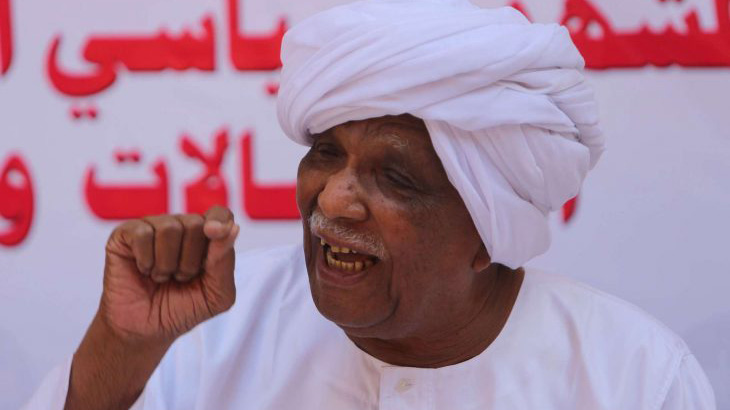On May 19, Sudanese security forces raided the home of the political secretary of the Sudanese Communist Party, Muhammad Mukhtar al-Khatib, and took him to an unknown destination, according to the party’s official page.
After the leaders of the Sudanese Communist Party were arrested in Juba, the Sudanese security forces arrested two leaders of the anti-coup movement of last October. They have since been released, but the incident has been widely denounced within the country and internationally.
The legal sector of the Sudanese Communist Party had explained in a press statement following the incident: “A team from the Security and General Intelligence Services arrested two members of the Central Committee delegation, returning from Juba this afternoon, they are Saleh Mahmoud, who was arrested from inside the Khartoum airport hall, and Muhammed Mukhtar Al-Khatib, the political secretary of the party who was arrested after he arrived at his home, as is the practice of the coup authority in restricting rights and freedoms.”
The sector expressed its denunciation and condemnation of this arbitrary arrest, calling for the immediate release of the two leaders.
Earlier, the Sudanese Communist Party confirmed the arrest of a number of its leaders yesterday by the authorities of South Sudan on their way back to the capital, Khartoum, from the city of Kauda in South Kordofan. The Communist Party delegation had met with a delegation from the Sudanese Liberation Movement, led by Abdel Wahed Mohamed Nour, and the Popular Movement, led by Abdel Aziz El Helou to discuss the party’s document “Sudan: The Crisis and the Way to Reclaim the Revolution”. This meeting was to serve the purpose of continuing the campaign to unify the revolutionary forces in Sudan, in order to overthrow the military coup and establish a democratic state and a just, comprehensive peace.
In a press statement, the Party expressed its strong condemnation of the detention and unjustified investigation of the leadership of a legitimate, legal party. The Party said: “The Communist Party heard from its delegation in Juba, in the state of South Sudan, that after their return from Kauda [the leaders] were arrested, detained, and interrogated by the External Security Service of the Government of South Sudan, about their travel to Kauda without notifying the authorities in the State of South Sudan.”
The official spokesman in charge of the Sudanese Communist Party, Hassan Othman, confirmed during his interview yesterday evening on the Al-Hadath channel that “what happened is not new, as extensive dialogues have been held and are continuing in order to unite the forces of the Sudanese revolution in achieving radical change,” noting that there are many charters proposed for dialogue, and that the Communist Party proposed the building of a unified center for the forces of the revolution, and “in this way, our delegation headed to Southern Sudan after holding a meeting with the militants Abdel Wahed Mohamed Nour [of the Sudanese Liberation Movement] and Abdel Aziz Al-Hilu [the People’s Movement] in Juba and Kauda, to complete the dialogue and sign charters that help the Sudanese political movement build a coalition of forces for radical change in the country.”
It is noteworthy that upon their arrival from the capital of South Sudan, Juba, the participants in the leadership delegation held a press conference, during which they presented the most prominent aspects of the meeting in Kaudua, including visits to the education plan and the health plan.
On the political level, the delegation met with the leader of the popular movement, Abdel Aziz Al-Hilu, and the two parties conducted several negotiations, and reached agreements regarding the current political issues related to the “unity of the revolutionary movement.”
Massive popular protests are still continuing in Sudan against the military’s control of the government, as the country has been experiencing deep political and economic turmoil, since the military coup was carried out last year and civilians were removed from the transitional government.
This article was originally published on Madaar.





